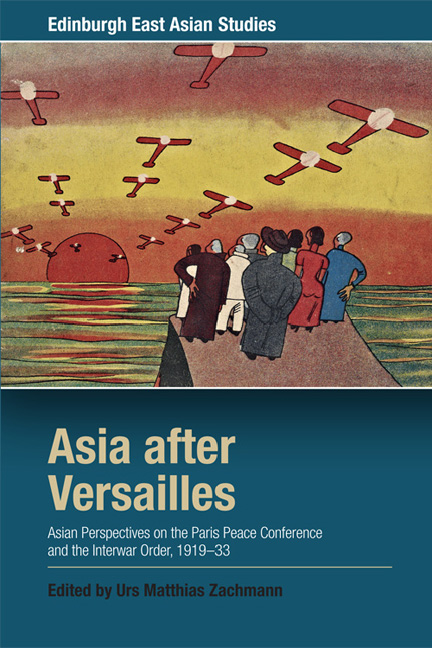 Asia after Versailles
Asia after Versailles Book contents
- Frontmatter
- Contents
- List of Illustrations
- Notes on Contributors
- Acknowledgments
- Introduction: Asia After Versailles
- Part I
- Part II
- 4 A Cultural History of Diplomacy: Reassessing the Japanese ‘Performance’ at the Paris Peace Conference
- 5 India's Freedom and the League of Nations: Public Debates 1919–33
- 6 Dashed Hopes: Japanese Buddhist Perspectives on the Paris Peace Conference
- 7 Particularism and Universalism in the New Nationalism of Post-Versailles Japan
- 8 Versailles and the Fate of Chinese Internationalism: Reassessing the Anarchist Case
- 9 The Impact of Versailles on Chinese Nationalism as Reflected in Shanghai Graphic and Urban Culture, 1919–31
- Index
6 - Dashed Hopes: Japanese Buddhist Perspectives on the Paris Peace Conference
from Part II
Published online by Cambridge University Press: 22 December 2017
- Frontmatter
- Contents
- List of Illustrations
- Notes on Contributors
- Acknowledgments
- Introduction: Asia After Versailles
- Part I
- Part II
- 4 A Cultural History of Diplomacy: Reassessing the Japanese ‘Performance’ at the Paris Peace Conference
- 5 India's Freedom and the League of Nations: Public Debates 1919–33
- 6 Dashed Hopes: Japanese Buddhist Perspectives on the Paris Peace Conference
- 7 Particularism and Universalism in the New Nationalism of Post-Versailles Japan
- 8 Versailles and the Fate of Chinese Internationalism: Reassessing the Anarchist Case
- 9 The Impact of Versailles on Chinese Nationalism as Reflected in Shanghai Graphic and Urban Culture, 1919–31
- Index
Summary
If we are to carry out a truly critical examination of Japan's colonial discourse, the tension and anxiety over the dominant West, which were constitutive of Japanese identity, must be taken into consideration.
(Rumi Sakamoto, ‘Race-ing Japan’, 2004)The Japanese ‘tension and anxiety over the dominant West’, referred to in the epigraph above, have roots deep in the nineteenth century, and thus predate anything that did, or did not, happen at the Paris Peace Conference in 1919. In the weeks leading up to, and the months of, the Peace Conference, though, there opened a window of widespread optimism – cautious, to be sure – grounded in the belief that the modus operandi of international imperialism had run its course. Many Japanese Buddhist intellectuals and leaders, both lay and priestly, joined in the global intoxication with Wilsonian idealism and held out hope that the Peace Conference would be the venue in which delegates drafted the blueprint for a new international order no longer based upon the acute economic and political competition, and fragile balance of powers, that culminated in the First World War. Their opinions on the conference, including two formal manifestos, were published in the leading Buddhist newspaper, Chūgai nippō, and exhibit a similar type of idealism, founded upon universal principles, to that which not only was prevalent in much of the Japanese press, but which was also, indeed, a worldwide phenomenon.
We know that this window of optimism closed all too quickly. The reasons it did so for many Japanese Buddhists are detailed below and demonstrate at least three things. Firstly, unlike the simplistic, and predominantly negative, portrayal of early twentieth-century Japanese Buddhism as ‘conservative’ and supportive of Japanese imperialism, many of its leading figures supported an internationalism undergirded by universal principles. Secondly, far from being peripheral to the Japanese experience, the decisions taken at the Peace Conference were carefully monitored and had profound repercussions in the years following the conference.
- Type
- Chapter
- Information
- Asia after VersaillesAsian Perspectives on the Paris Peace Conference and the Interwar Order, 1919-33, pp. 144 - 174Publisher: Edinburgh University PressPrint publication year: 2017


